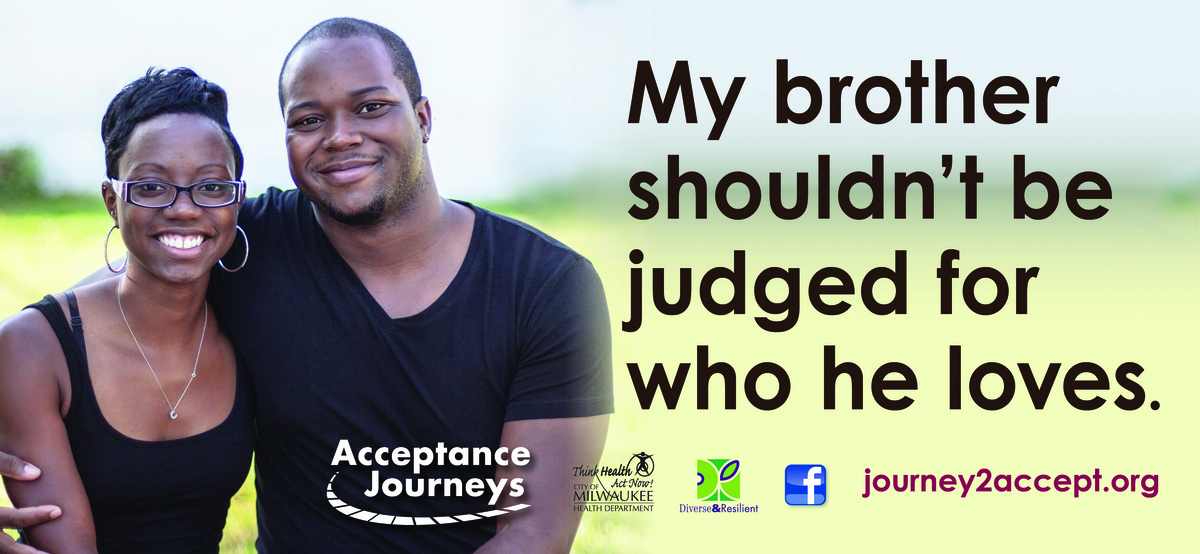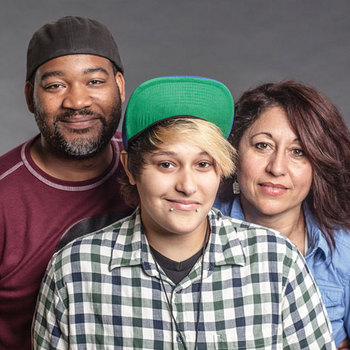A professor’s research helps a community explore its long-held beliefs

Chavon and Josh are among the family members, coworkers and friends featured in the Acceptance Journeys social marketing campaign, which includes billboards, story cards and bus ads. Read Chavon and Josh’s story.
Billboard image courtesy of Diverse & Resilient
Three years ago, residents in predominantly black neighborhoods in Milwaukee started seeing billboards and bus ads asking a compelling question: “Whose life could you change with love?”
The campaign, Acceptance Journeys, has a goal of reducing homophobia, which public health researchers say contributed to a 144 percent increase in HIV rates among young, gay, black men in Milwaukee County between 2000 and 2008. Many of the men have left home after coming out to their parents and being told, “You can’t live that lifestyle in my house.” Some have moved in with an older partner, turned to drug use, or ended up in other situations that lead to unprotected sex.

Shawnika Hull
But homophobia wasn’t part of the community’s vocabulary, even if it was part of the social environment driving HIV transmission. So Shawnika Hull, a UW–Madison assistant professor of journalism and mass communication who was in charge of messages for the campaign, and her collaborators decided that the best way to tackle the problem was to avoid using the word altogether.
“One of the things we were concerned about was creating a backlash,” says Hull, whose dissertation research centered on encouraging HIV testing among women of color. “If you go into the community and say, ‘You’re homophobic. Stop that!’ — that’s not a strategy that’s going to work.”
Hull and her colleagues rely on community focus groups to tailor messages for the campaign, which features images of straight people alongside the coworkers, friends or family members they accepted after learning they were gay. Their personal stories are featured on cards that are distributed through community organizations and churches.
“We don’t want to put this campaign into the field as it’s fully formed and just expect it to work,” she says. “We want to know if we’re causing harm or good.”

Khari, Eli and Amy are another family featured in the Acceptance Journeys campaign. Read their Story of Acceptance.
Photo: Diverse & Resilient
Focus groups noted that church is an important influence as a community develops its beliefs about sexuality. The campaign’s name is an allusion to “faith journeys,” language people commonly use when talking about their spiritual growth. “We chose Acceptance Journeys so that it’s clear to our target audience that we’re talking to you, with you,” Hull says.
With guidance from the focus groups, the campaign’s messages became less subtle last year, including the taglines, “I love my son just as he is” and “Who my daughter loves doesn’t change my love for her.”
This week, the project unveiled even stronger messages on new billboards and ads on city buses aimed at moving more people toward acceptance: “Acceptance means no strings attached” and “My brother shouldn’t be judged for who he loves.”
Acceptance Journeys is a collaborative effort including the UW Population Health Institute, the community-based organization Diverse & Resilient, the City of Milwaukee, the Medical College of Wisconsin, and the Wisconsin Department of Health Services AIDS/HIV Program. As the project continues, with help from a three-year grant from the Ira and Ineva Reilly Baldwin Wisconsin Idea Endowment, Hull will measure progress, comparing attitudes about gay people and transmission rates in Milwaukee to those in Cleveland, St. Louis, and Pittsburgh.
See more Stories of Acceptance from the campaign
But there is already anecdotal evidence that Acceptance Journeys is making an impact. A minister invited the project into his church and took an HIV test in front of his congregation, and people from the community have asked to be featured in the campaign.
“We recognize that everyone is on their own journey … and what we want to do is move people further,” Hull says. “We don’t think of behavior change as a dichotomy — either you’re homophobic or you’re not. People are at various places along this continuum.”
